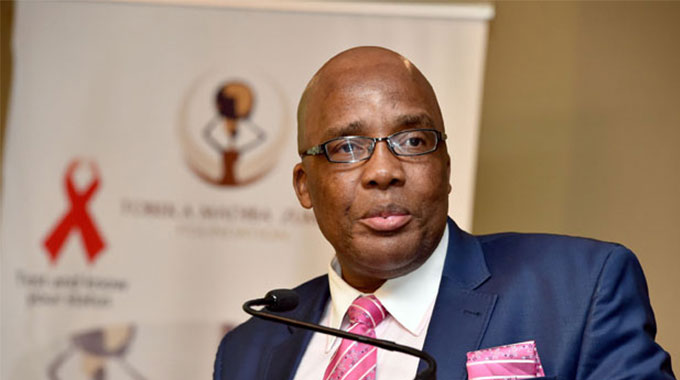Is relaxation of South African immigration law ideal?

Mthabisi Tshuma, Features Correspondent
THE recent decision by South Africa to relax immigration requirements for children travelling to that country may create a human trafficking problem.
After the announcement, made by Home Affairs Minister Pakitshe Aaron Motsoaledi, children are no longer required to carry additional documents like birth certificates and consent letters from their parents when travelling to South Africa.
Minister Motsoaledi said the waiver is granted on the condition that all other requirements for entry and departure from South Africa shall be met.
“I Dr Pakitshe Aaron Motsoaledi Minister of Home Affairs has with the powers bestowed upon me in terms of section 31 (2) of the Immigration Act 2002 Act number 13 of 2002 decided to grant a waiver to foreign children from visa exempt countries entering or departing the Republic from complying with the provisions of Regulation 6 of the immigration regulations 2014. The department is in the process of finalising amendments to the immigration Regulations in this regard,” he said.
According to the Minister, the immigration directive must be brought to the attention of all relevant officials.
“This means that foreign visa exempt children are no longer required to present a birth certificate, parental consent letter or other supporting documentation such as a death certificate or court order when travelling with one parent or legal guardian or someone other than a parent or legal guardian. This waiver is granted on the condition that all other requirements for entry and departure from the Republic shall be complied with,” reads the statement.
The 2019 Trafficking in Persons Report ranked South Africa at the Tier 2 Watchlist rank for two consecutive years.
Annually, the TIP Report ranks each country’s efforts to comply with the “minimum standards for the elimination of trafficking found in Section 108 of the Trafficking Victims Protection A (TVPA).
The Tier 2 Watchlist is defined as countries whose governments do not fully comply with the TVPA’s minimum standards, but are making significant efforts to bring themselves into compliance with those standards.
Characteristics of such a community are that the absolute number of victims of severe forms of trafficking is very significant or is significantly increasing and that there is a failure to provide evidence of increasing efforts to combat severe forms of trafficking in persons from the previous year.
Reports say the human trafficking business in Africa is a $13,1 billion industry. Out of this number, $8,9 billion comes from sexual exploitation. Victims of sex trafficking yield $21 800 each due to high demand, so even while forced labour has three times more victims, sexual exploitation generates more than double the profits.
With the waiver having been passed, it is almost inevitable that South Africa will find themselves caught on the wrong side and dropping on the ranks to Tier 3 which is defined as countries whose governments do not fully comply with the minimum standards and are not making significant efforts to do so.
The neighbouring country should take a leaf from Zimbabwe who have managed to demonstrate overall increasing efforts by addressing the human trafficking issue and rising through the ranks from Tier 3 Watchlist in 2018 to Tier 2 this year.
In 2010, Zimbabwe had become one of the major routes in Sadc for human trafficking, with most victims passing through the country on their way to South Africa. It is a trade that is said to have raked in an estimated $1,6 billion annually in sub-Saharan Africa due to lack of laws that criminalise it.
Some rural Zimbabwean men, women, and children are said to be trafficked to South African farms for agricultural labour and domestic servitude and to cities for domestic labor and commercial sexual exploitation. Women and children are trafficked for domestic labour and sexual exploitation in brothels among other places.
Last month, more than 30 Zimbabwean women suspected to be victims of human trafficking were rescued by South African police from brothels in eMalahleni, formerly Witbank, in Mpumalanga province where their captors used them as sex slaves.
The Zimbabweans were part of a group of 50 victims among them males from other countries which included the Democratic Republic of Congo and Nigeria as well as locals.
Weeks later, South African government saw it fit to raise a waiver on minors travelling to that country.
Last year, Lieutenant Colonel Parmanand Jagwa, the Hawks Gauteng coordinator of the illegal migration desk, and deputy director Rasigie Bhika said that human trafficking was a “growing activity” in the region with an overall 55 percent of human trafficking victims in South Africa being women.
A study in 2011 revealed that a hospital in South Africa’s city of Durban pleaded guilty to 109 counts of illegal organ transplants, where Brazilian and Romanian victims were compensated as little as $6 000 for organs worth anywhere from $100 000 to $120 000.
With South Africa being a prominent place for organ harvesting that allows recipients a maximum payout and the fact that only two percent of the country’s population are on the organ transplant registry, children from foreign countries might find themselves victims of this predicament.
Previously, children from visa exempt countries like Zimbabwe intending to travel to South Africa were required to carry a valid passport and additional supporting documents including a birth certificate, death certificate, consent letter when travelling with one parent or guardian but alas that will not be the case anymore.
On October 30, a four-year-old girl who was snatched from her home in Bulawayo’s Emganwini suburb by one Simphiwe Mlilo (21), on the pretext that she wanted to buy her some chips is a highlight of what the waiver could lead to.
When questioned by citizens in Tsholotsho, Matabeleland North province, where the child was found on November 10, Mlilo said she had been sent by a man who is believed to be on the run and intended to transport the innocent child to South Africa. It is most likely that the tot was going to be trafficked to that country, killed and her body parts sold for ritual purposes.
This should serve as a heads up to the South African government to reconsider the waiver or including certain formalities like birth certificate as proof of parentage and an affidavit from the parent who is not travelling with the child to prove that they had indeed agreed to let the child travel in a bid to curb the high human trafficking cases into that country. – @mthabisi_mthire.










Comments